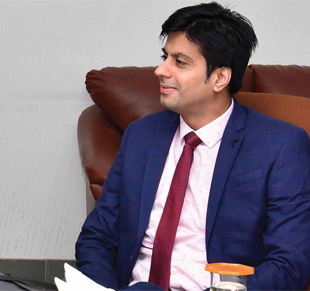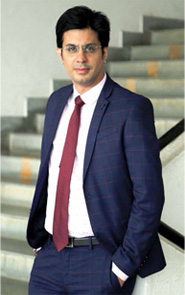An expert in the areas of Human Resource Management (HRM), Employee Relations and Employee Welfare, Recruiting and Sourcing and a Corporate Verification Consultant, Prakash Lakhiani, Associate Director - HR, CBRE, South Asia, believes that HR professionals have the advantage of not being too industry specific and are capable in their implementation of their HR skills, be it in real estate, finance or any other industry. Never a follower, he advocates that relationships are the key to everything in this world-be it personal or corporate and is extremely positive about the work culture prevalent in India. Prakash shares his career journey starting as an engineer and aspiring businessman in his heydays, who not only managed to change his career tracks to HR but also excelled in it. An excerpt from the interview
“We in HR need not be industry specific as such. ‘HR’ is ‘HR’ and we can be in any industry and that is possibly one of the reasons why I chose HR, as well as I didn’t want to necessarily be a part of any particular sector whether, finance industry or any other. An HR person in a finance organization can equally implement the same things as an HR personnel in CBRE as well”

From a career standpoint, I am an engineering graduate. But, when I did my engineering, my father ran a small motor and scooter parts business, which I possibly thought would take it forward. However in 2003, when the government slapped restrictive measures on industries to protect the Taj Mahal and the city of Agra from the ‘blackening’ impact of pollution, my father had to shut down that particular business. That is when I started to wonder on my next career move and did my Masters in Human Resources and was subsequently picked up by J P Morgan from campus. I also did an internship with them and J P Morgan became my first company to have engaged with from an insurance standpoint. I was with J P Morgan for about three years, post which I joined Bank of America. I then moved to the US for a while and worked with Steve & Barry’s for about a year and then I came back to India and was heading HR for Regus (Business Centers) across India, Singapore and Malaysia. It was in 2011, that I joined CBRE India and I have been with them for the past seven years. I head the entire acquisition and the gamut of their HR Business partnering across the West Southern region as associate director.
Luckily, HR people need not be industry specific as such. ‘HR’ is ‘HR’ and we can be in any industry and that is possibly one of the reasons why I chose HR, and also I didn’t want to necessarily be a part of any particular sector whether, finance industry or any other. An HR person in a finance organization can equally implement the same things as an HR personnel in CBRE as well. CBRE being one of the Fortune 500 companies ranks 207 currently in the Fortune 500 list. It has been a great journey from when I joined them-then they ranked 497 on the Fortune 500 list. When I joined CBRE, we were around 1270 odd employees but today we have a strength of more than 8000 employees it has been a great journey and a learning experience for me in these years.
Well, I am based in India as of now and I really like India than any other country. I would love to continue in India itself and not move to any other country for work-related purposes. I keep travelling a lot to other countries and my experiences working in Singapore or Malaysia was fantastic. However, I truly believe that the kind of culture, the kind of team work which exists in India is better. It is a more practical setup in those countries and is difficult to find anybody to be with you after your working hours. In India, we have a lot of bonding between our colleagues which is perhaps missing in the other international work setups.
No, I don’t feel there is any difference in working habits or culture. But, I just feel that there is a more open culture in India where we can share our thoughts and views without being judged constantly by others. In foreign countries, for example in Singapore people in office speak very softly. In India, we are very simple as a culture and can relate more to each other.
‘Free’, would not be the right word. Yes, we are governed by certain systems, policies in our work culture and so on, but, I think the bonding, the team work, the dependency and the level of comfort, which we have with each other is much better in India. And, I think if you have that, the end result would be much better as well.
I always say that you come through on your own because of the challenges. Why do you need a manager? I think, challenges are the only reason why I am employed. If there are no problems, there is no manager required, then all executives can come together and execute and then everything would be hunky dory, won’t it? I am thankful to God and to organizations that we have challenges. Every day is a challenge and every day you have to provide a solution. Challenges are problems. If you have a practical solution then apply it. But, if you don’t have a problem or a solution to that problem, the best thing to do at times is to do nothing at all. It would be even better if you are able to hold back in that situation.
I always tell my team members, especially the younger ones if there is an email which is a positive feedback or a stinker email. Most of these young people always say “I will reply back or I haven’t done this XYZ, etc..” In such situations, I always tell them to hold back for a while because you replying would not provide any particular solution at that time. So, how long can you hold back? It would be determined by the one’s level of composure on how one can deal with challenges. Because, if there was a solution to a particular problem, it would have already been implemented. You learn these only through experience. No book would actually teach you how to do this.
"At the end of the day, I need to connect with everybody and I spend a lot of time on relationships; As I believe relationships are the key to everything in this world — not only for corporates but any industry. If you have great relationships and if you are able to take feedback positively and work upon that — I think the outcomes should be great!”
I never advice them, and I don’t believe that office life is any different from personal life. I do not advice even my three-year-old son either. I let them be themselves as I do not believe in micro-management. If somebody comes to me for a particular suggestion, I do suggest but, I also tell them that there are 15 ways to try and apply your creativity, apply your mind and be yourselves. Do not try to be ‘Prakash’ or ‘Jayamalini’, or ‘Mukesh Ambani’. Be whoever you are as an individual and use your own creativity to get there. So, don’t try to use the solution that I have given you and apply that. It might not always work. However, if you get stuck somewhere, I am always there to come in and help. But, I am someone who kind of pushes others to get into the pool and tell them to swim you can’t learn swimming standing outside the pool. That’s the way I look at solutions.
I look for flaws, I look for cultural fitment and certain factors that implement these. If someone is extremely aggressive, say with his selling skills, I might not even get back to such candidates. I would rather say that they are not a ‘cultural fit’ to my organization because we are not aggressive as an organization. I would then ask the candidate if he/she had a softer approach or if they could tone down in this case. Human resources comprise of two words, so if you do not get the ‘human’ right, there is a big problem. ‘Resource’ equals skill, but, if you do not get the ‘resource’ right, you can still teach the skill. If you don’t know how to do certain things, I can probably teach you those but, if I do not get the right person from a cultural fitment point of view, will I be able to change a person molded from age one to age 21? So, I seek individuals with appropriate cultural fitment within my organization.
Yes, for some of the institutes. I have a problem with those institutes that teach students ‘this is the right way’ to answer, to something that ‘there is no right or wrong answer to any question’ and this is my personal view which might be completely wrong it is just about fitting in. During my engineering course, one of my batch mates asked a professor on why engineers working for a firm get paid in lakhs than say, the local electrician or the plumber, who is given a mere Rs.100 for fixing something? “Because the engineer knows exactly which screw to fix in a bundle of say 50 screws; he will not fix all 50 but just the relevant one”, was the professor’s prompt answer. This is the difference in knowledge that I am trying to highlight between what I am looking for and what the related outcome of this exercise is. That is why people do engineering! Otherwise, the job an engineer does can be done by anybody. That is the key and spells well for other faculties like management too. It comes with knowledge and experience.
“Be happy and spend as much time with people whom you are close to and this holds true for your work environment too. If you are content life gets easy”

Of course, we do look at merits but that is not the ‘whole and sole’ of what we are looking at personality matters the most. Personality does not mean somebody who speaks crisp English-absolutely not. Personality means how you are as an individual. I had met one of the students from a MBA college sometime back and I asked her why she had chosen HR. Her reply was, “As a personality, I am very calm and composed, I don’t think I was meant for marketing or finance but, meant for HR.” I think that’s possibly the right way to go about it. Well, because you should fit into what you are. You should have inherent passion to do what you want to do and if that is not there, it will fizzle out whatever you got.
I look more for the passion than skills but, I look at skills too!
Frankly speaking, I do not have a busy schedule because if I have to make time, I will make time for anybody and everybody. But, it is just that schedules are decided in terms of workloads and if workload is upon you then how you delegate and manage this workload is dependent on you. If someone has too much on their plate then how do you give that to somebody else and how do you manage relationships, also, there has to be camaraderie and friendship among team members. There has to be a bond which you build with each and every team member of such that they do a particular task with all happiness and not because they have to do it.
Even though my bread and butter is into talent acquisition, I am not too strong in judging people if they thought that it was the right thing to do at that point in time and if they did it, then I think it’s great if they are getting something out of it. They are able to make more in terms of money or designation and go faster in their goals then, I think it is great that they hop. If it works out for them then it is a win for them and if it was not a win, they should learn from this experience.
I love the younger generation. With changing times, we have to change as well and not tell them what they should or should not be doing. We are speaking as if we are everyone’s grandfathers- but, we are not. My view is to give them space; it’s a relationship and they will make those mistakes. If it is a mistake, maybe they will benefit out of that job hopping, maybe it might remain a mistake they can learn from-just like my three-year-old son who runs, he falls, he gets up and runs again. Younger generation will definitely learn from your experiences and it will benefit them in their future.
Technology is one of the answers to that. Older employees do not want to log on to the computers to put in a requisition, to mark attendance or to mark anything at all, but that’s all right. So, I have to become an enabler by not forcing them. Because I have built PeopleSoft, they need not have to compulsorily mark their attendance through that if they don’t want to. We have to avoid expressions like-“If you don’t mark attendance we will cut your salary.” What will happen is that they will probably start doing that, out of fear. But, if tomorrow a survey is rolled out then what have I become in their eyes? Am I an inspector or have I joined an army to fight with them. No, I am an HR and an enabler, and I have to see how I can make it easier for them.
Older employees do not enjoy technology from a software point of view so we bring in apps, which connect the technology to that app, so that they can go and mark attendance through their mobile phone. If they are averse to that then they can continue making entries on the register, which my team would translate. So, give them options and again, don’t be dictators. HR is an enabler and if somebody who does not understand that then they are in big trouble. I feel HR has to bridge that gap between the employee and guide them we are not here to slap do’s and don’ts on them!
“Challenges are problems. If you have a practical solution then apply it. But, if you don’t have a problem or a solution to that problem, the best thing to do at times is to do nothing at all. It would be even better if you are able to hold back in that situation”

Starts with my son and ends with him. When it comes to work, over a period of time, a lot of things get into motion and lot of things are set, so you know how things would be working. But, every day comes up with a new challenges- a lot of issues crop up across some other cities, in some other countries or some other software related issues and so on. Therefore, you need to go prepared with a fresh mind everyday so as to hear out and accept that I will be facing a lot more today and how would you come out of that? That’s how my day spans out. Honestly, I am not extremely organized as a person like someone who likes to follow a calendar. In fact, I do not like to follow anybody in this world; I am not born like that and I do not come in the follower category. So, in that regard, I do not even like to follow time. I do understand the importance of time I will be on time for every activity but, I do not like to follow anyone. I like to keep my interviews and meetings fixed but, at the end of the day, I need to connect with everybody and I spend a lot of time on relationships, as I believe relationships are the key to everything in this world not only for corporates but any industry. If you have great relationships and if you are able to take feedback positively and work upon that then I think the outcomes should be great.
I keep unwinding with my children and I have a lot of activities, which I do with them. I go to a certain club and play some sports everyday whether it is swimming, squash or table tennis. We used to watch a lot of movies but with two young children it is very difficult now.
Only thing that I have learnt over these years, is not to go in with expectations. This can be called as my philosophy of life, but I would not call it o. I do respect a lot of people who have the required need for wealth. We all obviously do, and I too need it as well, but for me, money is just paper and metal. My philosophy in life is not to set out for something which is linked to commercial gains because to achieve that, you will not be able to achieve contentment. Your desire for 10 crores, will become 50 and from that to 100 crores and you will lose all contentment. Be realistic and live life for today. Be happy and spend as much time with people whom you are close to and this holds true for your work environment too. If you are content life gets easy!
By Shantanu Relekar